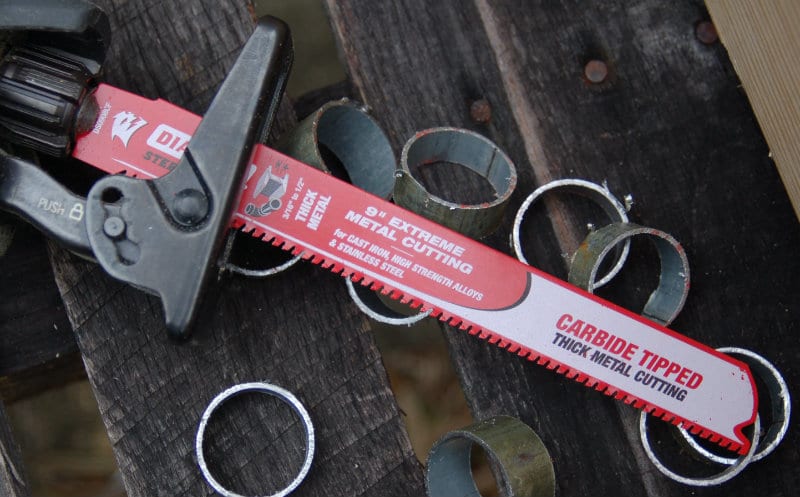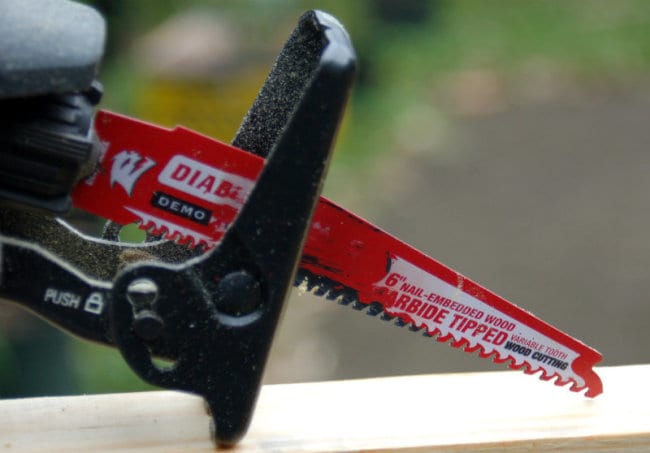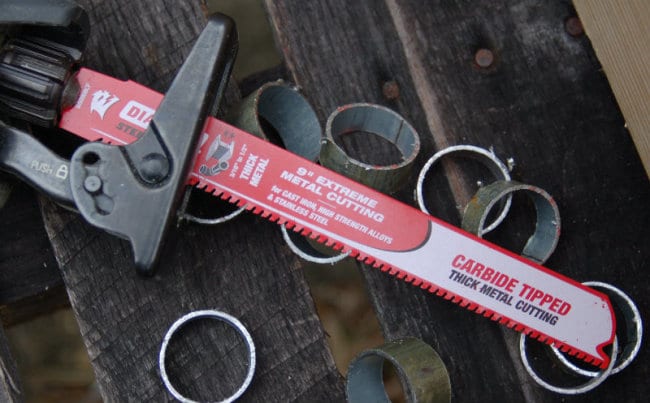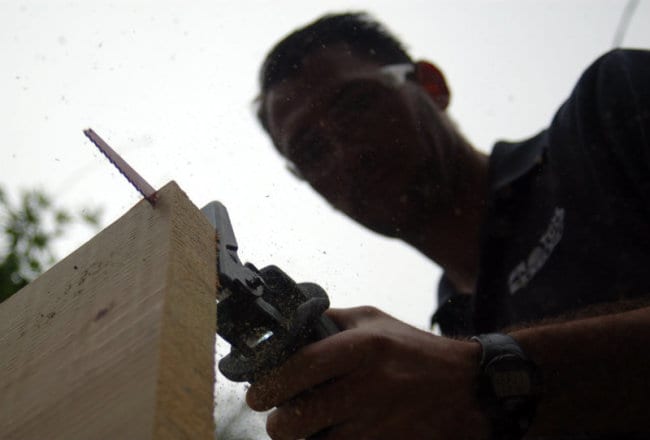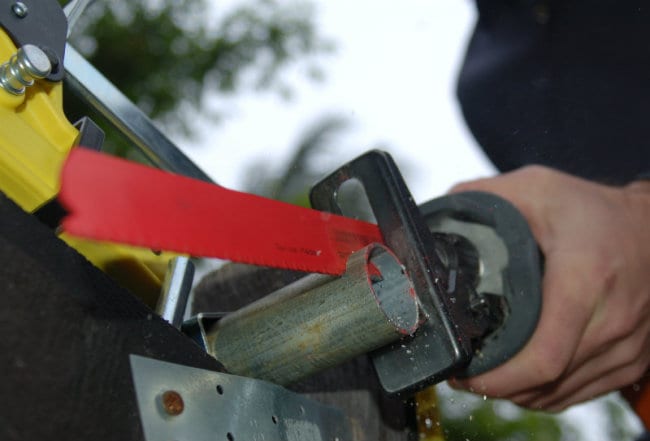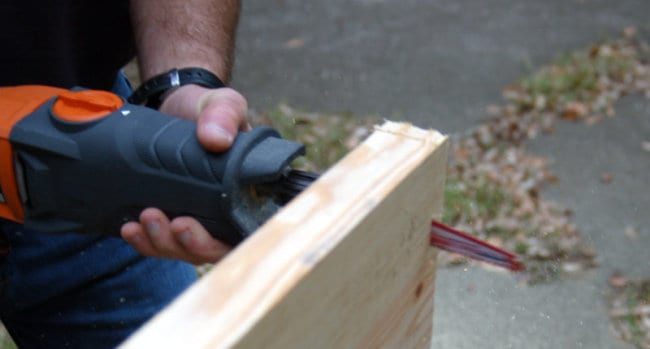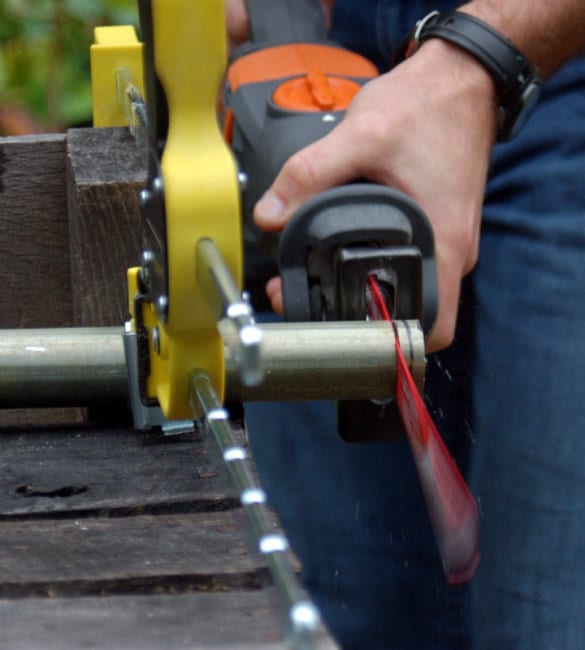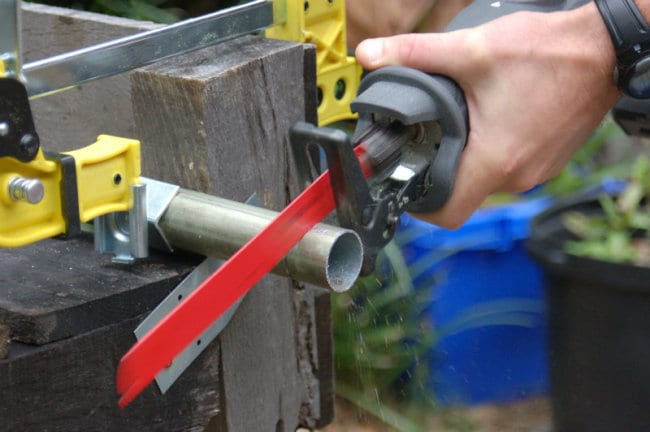What would happen if Diablo took the idea of their carbide tipped circular saw blades with their bonding process and applied it to reciprocating saw blades? You’d get the new Diablo Carbide Tipped Recip Blades. We first introduced these to you at STAFDA back in November, and now we have some in house to test for ourselves. The blades performed magnificently in testing, easily beating the other blades that were tested from Lenox and Milwaukee. They cut through wood embedded with fluted masonry nails, stainless steel pipe, and even cast iron with apparent ease. One impressive demonstration showed how the Steel Demon Carbide Tipped Recip Blade can be used for vehicle extraction where the Jaws of Life fail. Impressive, right? Without a doubt. Let’s take closer look at what these blades are all about and see if our objective testing can validate the manufacturer’s claims about the Diablo Carbide Tipped Recip Blades.
Diablo Carbide Tipped Recip Blade Specifications
Diablo Carbide Tipped Recip Blade: Demo Demon
- Application: Nail Embedded Wood
- Available Sizes: 6″, 9″, 12″
- Teeth Per Inch (TPI): 6 – 9 variable
- 6″ Single Blade Pricing: $6.97 (Buy it on Amazon)
- 9″ Single Blade Pricing: $9.97 (Buy it on Amazon)
- 12″ Single Blade Pricing: $12.97 (Buy it on Amazon)
Aside from the carbide teeth on the Demo Demon Carbide Tipped Recip Blade, one feature that really stands out is the variable TPI rating. Diablo tells us that this increases cutting speed while decreasing vibration. It’s 9 TPI on the side closest to the saw and switches to 6 TPI about halfway down. There’s really not a good way for me to isolate either side without risking damage to my saw, so I’m just going to have to trust that this is true for now.
Diablo Carbide Tipped Recip Blade: Steel Demon
- Application: Cast Iron, Steel, Stainless Steel, Metal Alloys, Thick Metal
- Available Sizes: 4″, 6″. 9″
- Teeth Per Inch (TPI): 8 fixed
- 4″ Single Blade Pricing: $7.97
- 6″ Single Blade Pricing: $10.97
- 9″ Single Blade Pricing: $14.97 (Buy it on Amazon)
*Retail price based on current Home Depot advertised prices
What’s really impressive about the Steel Demon Carbide Tipped Recip Blades is the number of really tough materials they are rated to cut through. Typically, you’re not going to find a blade with teeth to cut through cast iron. That’s usually a job reserved for a diamond grit style blade. In addition to what it’s rated for, I also had the opportunity to watch it cut through a vehicle frame that included a Boron rod. I don’t have any Boron handy and I’m not going to be slicing through my car just for a picture, but if you’re feeling some angst towards your vehicle… well, just be sure to share the pictures with us on Facebook.
Using Diablo Carbide Tipped Recip Blades
The first thing I did was to put the nail embedded wood blade to the test. I compared it to the Milwaukee Ax blade, which we used in our Heavy Duty Recip Saw Shootout for its solid reputation for fast cutting and durability. Before pounding some nails into my 2 x 12 pressure treated board, I took a few cuts with each blade to see if there was any appreciable difference in speed or vibration.
I really didn’t notice much difference in speed at first. In fact, it seemed like the Milwaukee Ax was cutting just a bit faster. When I did some timed testing, sure enough the Diablo Demo Demon was slower by just over a second. The real difference was in vibration. It was more than just noticeable how much more stable the Diablo Carbide Tipped Recip Blade was in this test. Both blades share the characteristic 1″ height to add rigidity, but Diablo’s design was clearly superior in vibration control.
Once I was satisfied with chopping up wood, I took the Steel Demon to hack away at some steel pipe. This time, I put Diablo up against the Milwaukee Double Duty Torch recip blade. This was also used in our heavy duty reciprocating saw shootout because of its cutting speed and durability. Here, Diablo’s Steel Demon was ever so slightly faster at cutting this thin steel pipe by about 0.1 second. Vibration seemed to be about the same, perhaps slightly tilted towards Milwaukee. It wasn’t a difference I could feel every time though. The real difference that I felt between the two blades started with Milwaukee’s consistent cutting speed from start to finish. The Steel Demon started into the cut a little slower. Once it breached the surface and the teeth really bit into the metal, it was much faster. However, when you are cutting thicker material, Diablo’s advantage will start to become more advantageous.
Other Considerations of Diablo Carbide Tipped Recip Blades
Okay, so when it comes to putting these two premium recip blades together, who wins? I’ll definitely take the Diablo Demo Demon for its vibration control. For these brief tests, the Steel Demon is a toss up… until you consider the durability. The two tests that I put the Diablo Carbide Tipped Recip Blades through are very common applications; standard nail embedded wood and thin walled steel pipe. Diablo does have a major advantage over Milwaukee and everyone else on the market when it comes to some applications that are not as common.
All nail embedded wood blades should cut fairly well through my test. But there’s a difference if you’re doing some demo work on wood that has been nailed to an exterior wall. Often, this is accomplished using fluted masonry nails. While I didn’t have any on hand to test, I did see these at work in Charlotte and it makes a difference. Some blades won’t cut through them at all. The Ax will, but very slowly and the blade wears out quickly on that kind of metal. Diablo’s Demo Demon will make it through those nails almost as quickly as common ones.
What about the Steel Demon? There are some uncommon material advantages here as well. While most metal blades will cut the majority of the steel blends that you come across, there’s a good chance that materials like cast iron won’t be phased by it. Diablo Steel Demon Blades cut through cast iron and even some of the toughest metals that are used to strengthen vehicle frames. There is also added durability here. Even though other blades will cut through thicker metals that they are rated for, it chews up the teeth in a hurry.
Conclusions
The question that I hear Diablo reps ask constantly is not about the cost per blade. If that’s all you’re looking at, you’ll choose something else. What they’re asking you to look at, and the perspective that I prefer to take, is the cost per cut. If I know that I can get 10 times the number of cuts out of a Diablo blade over other premium blades, then it’s worth the extra couple of dollars up front.
So about the Diablo Demo Demon Carbide Tipped Recip Blade: It’s the lowest vibration I’ve felt come from just a blade design. In common applications, it’s a little slower than other premium blades, but not enough to deter me. It’ll also cut where other can’t or fail quickly. These are my new go-to wood blades.
As for the Diablo Steel Demon Carbide Tipped Recip Blade, I’m not sold that it’s the best on it’s speed or vibration control for thin walled applications. There is no question that you’ll get a major advantage in speed on thick metal applications. How it earns a spot in my tool box is its versatility around thick metals and cast iron as well as the durability to work longer than others on the market.
Check out our video comparing Diablo Carbide Tipped Recip Blades to Milwaukee’s Ax and Double Duty Torch!

